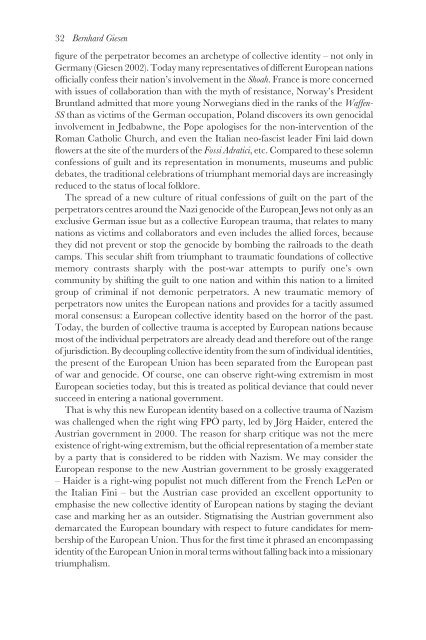Europeanisation, National Identities and Migration ... - europeanization
Europeanisation, National Identities and Migration ... - europeanization
Europeanisation, National Identities and Migration ... - europeanization
Create successful ePaper yourself
Turn your PDF publications into a flip-book with our unique Google optimized e-Paper software.
32 Bernhard Giesen<br />
figure of the perpetrator becomes an archetype of collective identity – not only in<br />
Germany (Giesen 2002). Today many representatives of different European nations<br />
officially confess their nation’s involvement in the Shoah. France is more concerned<br />
with issues of collaboration than with the myth of resistance, Norway’s President<br />
Bruntl<strong>and</strong> admitted that more young Norwegians died in the ranks of the Waffen-<br />
SS than as victims of the German occupation, Pol<strong>and</strong> discovers its own genocidal<br />
involvement in Jedbabwne, the Pope apologises for the non-intervention of the<br />
Roman Catholic Church, <strong>and</strong> even the Italian neo-fascist leader Fini laid down<br />
flowers at the site of the murders of the Fossi Adratici, etc. Compared to these solemn<br />
confessions of guilt <strong>and</strong> its representation in monuments, museums <strong>and</strong> public<br />
debates, the traditional celebrations of triumphant memorial days are increasingly<br />
reduced to the status of local folklore.<br />
The spread of a new culture of ritual confessions of guilt on the part of the<br />
perpetrators centres around the Nazi genocide of the European Jews not only as an<br />
exclusive German issue but as a collective European trauma, that relates to many<br />
nations as victims <strong>and</strong> collaborators <strong>and</strong> even includes the allied forces, because<br />
they did not prevent or stop the genocide by bombing the railroads to the death<br />
camps. This secular shift from triumphant to traumatic foundations of collective<br />
memory contrasts sharply with the post-war attempts to purify one’s own<br />
community by shifting the guilt to one nation <strong>and</strong> within this nation to a limited<br />
group of criminal if not demonic perpetrators. A new traumatic memory of<br />
perpetrators now unites the European nations <strong>and</strong> provides for a tacitly assumed<br />
moral consensus: a European collective identity based on the horror of the past.<br />
Today, the burden of collective trauma is accepted by European nations because<br />
most of the individual perpetrators are already dead <strong>and</strong> therefore out of the range<br />
of jurisdiction. By decoupling collective identity from the sum of individual identities,<br />
the present of the European Union has been separated from the European past<br />
of war <strong>and</strong> genocide. Of course, one can observe right-wing extremism in most<br />
European societies today, but this is treated as political deviance that could never<br />
succeed in entering a national government.<br />
That is why this new European identity based on a collective trauma of Nazism<br />
was challenged when the right wing FPÖ party, led by Jörg Haider, entered the<br />
Austrian government in 2000. The reason for sharp critique was not the mere<br />
existence of right-wing extremism, but the official representation of a member state<br />
by a party that is considered to be ridden with Nazism. We may consider the<br />
European response to the new Austrian government to be grossly exaggerated<br />
– Haider is a right-wing populist not much different from the French LePen or<br />
the Italian Fini – but the Austrian case provided an excellent opportunity to<br />
emphasise the new collective identity of European nations by staging the deviant<br />
case <strong>and</strong> marking her as an outsider. Stigmatising the Austrian government also<br />
demarcated the European boundary with respect to future c<strong>and</strong>idates for membership<br />
of the European Union. Thus for the first time it phrased an encompassing<br />
identity of the European Union in moral terms without falling back into a missionary<br />
triumphalism.



